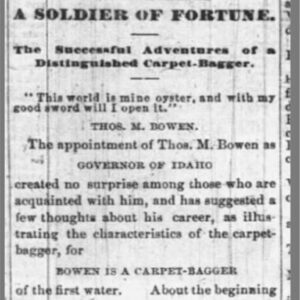calsfoundation@cals.org
Thomas Meade Bowen (1835–1906)
Thomas Meade Bowen was a Civil War officer for the Union, president of the 1868 Arkansas Constitutional Convention, and an Arkansas Supreme Court justice. He was involved in the extremely factionalized Republican Party during Reconstruction in Arkansas. After serving on the Arkansas Supreme Court, Bowen accepted an appointment from President Ulysses S. Grant to become governor of the Idaho Territory. Bowen returned to Arkansas shortly after and then moved to Colorado to pursue mining ventures. There, he also served in the Colorado State Senate.
Thomas Bowen was born on October 26, 1835, near Burlington, Iowa. He attended Mount Pleasant Academy and began practicing law at age eighteen in 1853. In 1856, Bowen was elected to the Iowa House of Representatives. Before the outbreak of the Civil War, Bowen moved to Kansas, where he organized and commanded the Thirteenth Kansas Infantry. He was given the honorary position of brigadier general of volunteers in 1865. After the war, Bowen moved to Arkansas in 1866 and lived in Crawford County, where he married Margarette Thurston.
Bowen quickly established himself as a prominent Republican lawyer and farmer. In 1868, voters in Crawford County elected him as delegate to the 1868 Arkansas Constitutional Convention. He was then elected president of the convention by the delegates. The convention was dominated by Radical Republicans who were primarily white non-Arkansans. The Republican-controlled convention, under the guidance of Bowen, drafted a constitution similar to the previous constitution. The main differences were the inclusion of African-American suffrage and a requirement that public education be provided by the state government. Despite opposition from Democrats and moderate Republicans, the new constitution was passed by the convention and ratified by a vote of the people in March 1868.
Bowen played a key role in the gubernatorial elections in 1868. He served as a member of the Republican Party in Arkansas. He, along with other 137 other members, chose Powell Clayton as the Republican gubernatorial nominee for governor and James M. Johnson as the nominee for lieutenant governor. The Democratic State Convention of 1868 refused to recognize the new constitution mainly because it gave African Americans the right to vote. Thus, the Democratic Party nominated no candidates for governor or lieutenant governor. This gave Clayton the gubernatorial position and resulted in a Republican-dominated state government.
Soon after, in 1867, Bowen was appointed as associate justice of the Arkansas Supreme Court by Clayton. He held that position for three years, until 1871. Bowen resigned from the court in August 1871 and accepted an appointment by President Ulysses Grant to become governor of the Idaho Territory. He served for one week as governor before resigning and returning to Arkansas.
Upon his return to Arkansas, Bowen once again became embroiled in political fighting between Radical Republicans and “Liberal” Republicans. Bowen and Clayton belonged to the group of Radical Republicans, while Lieutenant Governor James M. Johnson and Joseph Brooks belonged to the Liberal faction. Tensions between the two groups reached a climax in late 1871 when Liberal Republicans and Democrats, led by Johnson, began the impeachment process to remove Clayton from office. Thomas Bowen was picked by Clayton to serve as his legal counsel during his impeachment trial. The charges were dropped in 1872.
Bowen ran for the Arkansas Senate in 1872 but was defeated by Stephen W. Dorsey. In 1875, Bowen moved to Del Norte, Colorado, and became a successful lawyer and mining entrepreneur. He went on to serve as a judge in Colorado’s Fourth Judicial Circuit in 1876 and then was elected as a member of the Colorado State House of Representatives in 1882. He resigned that office when he was elected to the U.S. Senate, in which he served from 1883 to 1889. Bowen maintained his wealth and died in Pueblo, Colorado, on December 30, 1906.
For additional information:
Burnside, William H. The Honorable Powell Clayton. Conway, AR: University of Central Arkansas Press, 1991.
“Ex-Senator Bowen Dead.” New York Times, January 1, 1907. https://www.nytimes.com/1907/01/01/archives/exsenator-bowen-dead-had-been-prominent-in-politics-in-kansas.html (accessed January 24, 2020).
Stafford, L. Scott. “The Arkansas Supreme Court and the Aftermath of the Civil War.” University of Arkansas at Little Rock Law Review 23 (2001): 355–407. Online at https://lawrepository.ualr.edu/lawreview/vol23/iss2/2 (accessed January 24, 2020).
Matthew C. Kirkpatrick
Lyon College
 Civil War through Reconstruction, 1861 through 1874
Civil War through Reconstruction, 1861 through 1874 Politics and Government
Politics and Government Thomas M. Bowen Story
Thomas M. Bowen Story 




Comments
No comments on this entry yet.